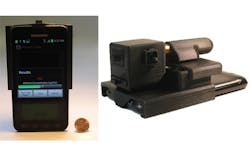UCLA researchers create small Android/iPhone fluorescence device for common kidney tests
Los Angeles, CA--A lightweight and field-portable device invented at the University of California, Los Angeles (UCLA) that conducts kidney tests and transmits data through a smartphone attachment may significantly reduce the need for frequent office visits by people with diabetes and others with chronic kidney ailments.
The smartphone-based device was developed in the research lab of Aydogan Ozcan, a professor of electrical engineering and bioengineering at UCLA, and associate director of the California NanoSystems Institute. Weighing about 40 g, the device can determine levels of albumin in the patient's urine and transmit the results within seconds. Albumin is a protein in blood that is a sign of danger when found in urine.
Ozcan's lab also developed the optomechanical phone attachment, disposable test tubes, Android app, and software to transmit the data. The research was published this month in the journal Lab on a Chip.
The device projects beams of visible light from two separate LEDs through two small fluorescent tubes attached to the device, one containing a control liquid and the other a urine sample mixed with fluorescent dyes. The smartphone camera captures the fluorescence after it passes through an additional lens.
Takes only five minutes
An Android application then processes the raw images in less than one second and the device transmits the test results to a database or health care provider. The test, which measures albumin concentration in urine, is accurate to within less than 10 micrograms per milliliter, according to the research, well within accepted clinical standards used in diagnosing conditions such as microalbuminuria, the excretion of albumin in urine. The time it takes to conduct a test, including preparation of a sample using a small syringe to inject the urine into a fluorescent tube, is about five minutes.
Ozcan estimates that the device—for which his lab has also developed an iPhone app—could be produced commercially for $50 to $100 per unit. "Albumin testing is frequently done to assess kidney damage, especially for diabetes patients," he says. "This device provides an extremely convenient platform for chronic patients at home or in remote locations where cell phones work."
Conventionally, patients at risk for diabetes, kidney disease, and other ailments must regularly provide fluid samples—sometimes more than one a day—to monitor their health, which requires visits to labs or health centers.
Source: http://newsroom.ucla.edu/portal/ucla/ucla-researchers-invent-portable-247974.aspx

John Wallace | Senior Technical Editor (1998-2022)
John Wallace was with Laser Focus World for nearly 25 years, retiring in late June 2022. He obtained a bachelor's degree in mechanical engineering and physics at Rutgers University and a master's in optical engineering at the University of Rochester. Before becoming an editor, John worked as an engineer at RCA, Exxon, Eastman Kodak, and GCA Corporation.
